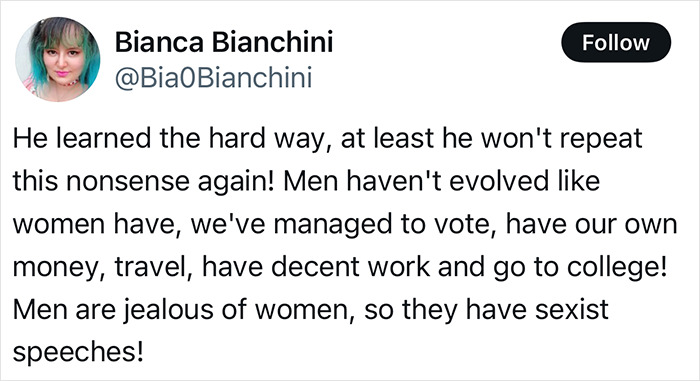In what’s believed by some to be a clear case of the ends justifying the means, a video of a boy being locked outside his home by her sister to teach him “not to be misogynistic” went massively viral.
Uploaded last Wednesday (April 23), the clip—which has garnered over 4.4 million views and 1 million likes—shows TikTok model Maria Taisla casually questioning her younger brother about gender roles.
At one point, Sebastian, who appears to be around six years old, says that women “have to stay at home” while men are allowed to be out in the streets. In response, Maria tricks him into stepping outside the door, with the kid smiling nervously, then locks him out, causing him to cry in fear and confusion.
The video was widely praised by Maria’s followers, who said that she was “teaching her brother a lesson,” while others were horrified by what they saw as exploitation of a child’s fear of internet clout.
A woman goes viral after locking her little brother outside their house to “teach him not to be misogynistic”

As the video spread through various social media platforms, Maria’s supporters flooded their comment sections with praise for her “unconventional” teaching method.
“At least he learned through pain not to repeat that nonsense!” one user said.
“I agree with this. He’s learning from a young age to grow into a real man,” another replied, echoing the sentiments of many who saw Maria’s actions as a necessary form of tough love that’s better administered at an early age.
“This is how you fight sexism: from an early age,” a viewer argued. “Poor boy, but it’s better for him to be scared now than to make a woman suffer in the future.”

At the same time, an equally vocal portion of users felt uncomfortable about the stunt, arguing that Sebastian, being only a small child, was simply repeating what he heard from adults.
“I bet he heard that from adults. The child isn’t at fault—he didn’t come up with that idea out of nowhere,” a viewer wrote.
As Bored Panda previously reported, a similar incident occurred earlier this year, when a Canadian reporter was yelled at by a young boy with obscene words, seemingly motivated by his father.
Detractors said that Maria causing him emotional distress in exchange for social media views was unethical—and potentially dangerous.
Critics argue that the TikToker used her brother’s distress for internet fame

This isn’t the first time Maria Taisla has featured her younger brother in her content. In previous videos, Sebastian was seen dancing, dressing up, and happily participating in her antics. To some, this history made her decision to use his fear for a viral video even more questionable.
“Where is child protective services?” one user asked. “She’s clearly committing psychological ab*se against a child and posting it online.”

Some went as far as to suggest the TikToker set up the entire video—which has become her second most popular one—in order to go viral.
They argue that Sebastian’s history of following her instructions in previous videos, along with the clip being pinned to the top of her profile, points to Maria using the controversial topic to gain relevance.

Others were horrified by what they saw as the model putting her brother in danger, recalling real-life tragedies to show how dangerous such “lessons” can be.
“I remember a case where parents put a little girl outside just to scare her, and in that short time, she disappeared and was found dead days later,” one netizen said.
The clip’s virality in Brazil was explained in part by the country’s persistent gender-based violence problems

The video was particularly poignant to its native Brazilian viewers, who come from a country where, according to World Bank statistics, approximately one in four women suffer some violence or aggression every year.
The issue has only worsened over the years, with 2023 data provided by the Brazilian Forum on Public Safety showing that every indicator of gender-based violence, such as m*rder, harassment, and stalking, increased when compared to previous years.

According to Samira Bueno, the forum’s executive director, the issue worsened dramatically in the aftermath of the pandemic—and shows no signs of slowing down.

“Since 2021, the figures for violence against women have been increasing at an accelerated rate, and they’re much higher than in the pre-pandemic period,” she said in an interview with The Guardian.
“Brazil has always been a very violent country, but it seems that the pandemic changed something. The tensions that arose in the domestic environment potentially exacerbated all these forms of violence.”
Users continued to debate Maria’s methods, unable to find common ground

The video’s virality motivated a broader discussion about the correct way to address harmful ideas in young children.
While some argue that drastic and early interventions are crucial, others point out that inducing fear can backfire, causing long-term resentment instead of change.
Debate among viewers continued, with both sides arguing over the line between education and exploitation, especially when children are involved and when “likes,” views, and money are on the line.
“The sister wasn’t wrong—and if she was, it was in trying to do the right thing,” one of her fans argued.
“That isn’t the right way. She’ll end up turning him bitter instead of teaching him to respect women,” another said.
Content in Brazilian Portuguese was translated into English.
“Diva.” Maria’s fans flooded social media with praise for her “teaching method”



























